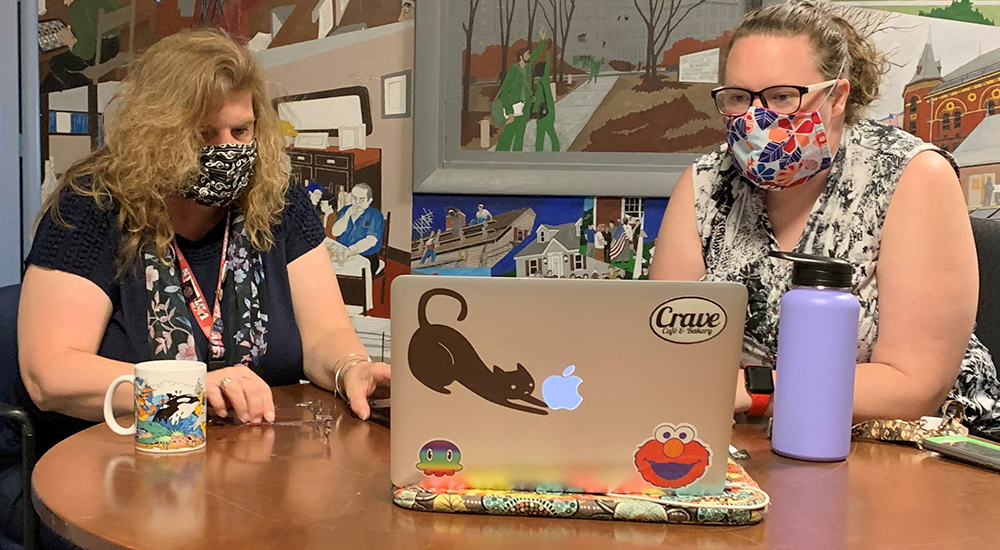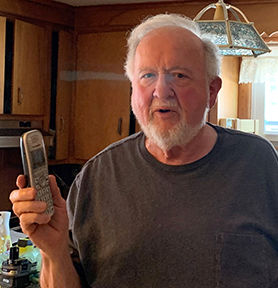Richard Cote, a Navy Vietnam-era Veteran, calls in to a virtual coffee every day from his home in Lowell, Mass.
Joining him are other Veterans from the region and Veteran peer specialists from the nearby Bedford VA Medical Center.
With the COVID-19 pandemic preventing many Veterans from leaving home and impacting their ability to see a VA clinician for face-to-face care, the VA New England Healthcare System has relied on its 80 Veteran peer specialists to ensure Veterans stay connected.
Veteran peer specialists at Bedford VAMC established a video chatroom link in March, near the start of the pandemic, as an impromptu way for Veterans to meet up each morning for a “How goes it?” chat over coffee.
“It’s a great way to start the day,” says Cote, who fixed jet engines on fighters and attack jets when he served stateside in the Navy during the Vietnam War.
Veteran peer specialists at Bedford VAMC
For many Veterans, VA peer specialists are their main source of daily human interaction. Calls can sometimes last an hour and a half. They provide a much-needed daily ritual for Veterans to check in with one another. The purpose is simple – to talk and see how everybody is doing.
“Just to check in and ask, ‘Are you doing OK?’” says Anthony Russo, a Navy Veteran who supervises a team of VA Veteran peer specialists.
The sessions have allowed Veterans a simple and convenient way to socialize and continue relationships that otherwise would have been difficult without the video coffees.
“It’s the highlight of my day,” says Cote, who used to go to in-person coffees with other Veterans before the pandemic. “Now there’s no other way to get together in person so these virtual coffees work out just fine.”
The coffee chats, conducted over video conferencing, allow Veterans an opportunity to discuss what’s on their mind during the pandemic. It also gives them a chance to share information and ideas. More importantly, Cote says it’s an excellent way to help reduce everyone’s anxiety and stress. That includes the stress of the peer specialists, who share many of the same day-to-day life struggles and concerns.
Understanding based on our shared experiences
“Our team gets just as much out of the coffees as the Veterans calling in,” says Russo. “The role of a peer specialist is more important now with COVID-19. We can provide empathy and understanding based on our shared experiences. We are using our life experiences, whether it be with mental illness or with a substance use disorder, to help and mentor others going through similar struggles.”
Cote credits the two VA Veteran peer specialists in the photo above, Karen Milliken, a Navy Gulf War Veteran, and Jessica Mack, an Air Force Veteran of Operation Enduring Freedom, for keeping the calls both informative and lighthearted. Photo by Charlotte Doherty, Veteran peer support specialist and Air Force Veteran.
“They really keep it a lot of fun – they make you want to call in every day,” says Cote.
Fourth of July presented an opportunity for the group to celebrate virtually with a special Independence Day-themed coffee, complete with holiday trivia and letter writing to hospitalized Veterans.
While the coffee chats have been a way to inject a sense of relative normalcy during a time when many Veterans are juggling family and work obligations and dealing with the challenges of a pandemic, they can also be life changing.
During a recent call, Cote says important information was shared about a VA monthly free produce market where Veterans can drive up and get free fresh vegetables and other food items.
“The coffees are so important to me; it is where the Veterans form friendships,” says Veteran peer specialist Milliken. “I have seen the guys form and build these bonds. They worry, care, and check on each other.”
Veterans supporting one another
Psychologist Jay Gorman, VA New England’s Mental Illness Research, Education and Clinical Center, had more to add. “Ultimately, we want Veterans to be healthy and safe. But we also recognize that we are in a global crisis. With that comes more stress which can lead to an increase in mental health challenges.
“I’m inspired by the work of my colleagues and the Veteran community here in New England and I’m also proud of the platform we’ve created to not just support Veterans but enable Veterans to support one another.”
For a day in the life, here’s more with VA Connecticut Veteran certified peer specialists talking about how they connect with Veterans during the COVID-19 pandemic.
Topics in this story
More Stories
Veteran Byron Potier weighed almost 300 pounds and was tired and lethargic. He was the perfect candidate for gastric sleeve surgery.
How much do you know about VA care, benefits and services? Don’t miss out on what you've earned—check out the "2025 VA Federal Benefits Guide for Veterans, Dependents, Survivors, and Caregivers" handbook to learn more.
Feeling stressed? Your breath can help you relax and focus. Take 3 minutes to reset and prioritize your well being for this week's #LiveWholeHealth practice.








So, lets just pay the employees to sit on their fat lazy butts while they expect veterans to do their jobs for them, WITHOUT pay. Yup, interesting.
Ashleigh Williams what does you comment have to do with peer veterans?
Stop the disgusting animal cruelty DoVA!!!!!!
How would Veterans, who are interested in becoming Peer Support Volunteers, sign up to help other Veterans isolated by COVID?
Interesting.